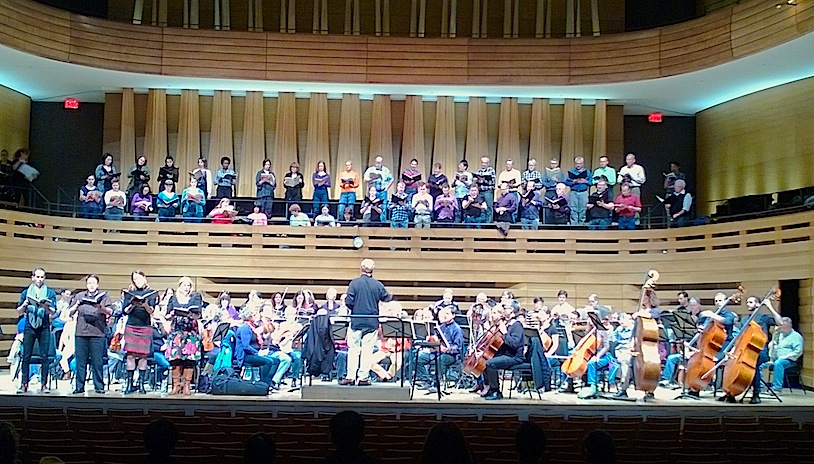
On Wednesday night, the Toronto Mendelssohn Choir, soloists, orchestra and conductor Noel Edison perform one of the monuments of early 19th century choral music, Ludwig van Beethoven’s Missa Solemnis. Because I’m going to be elsewhere that night, the choir kindly let me sit in on Monday night’s dress rehearsal.
- Classical Music 101: What Does A Conductor Do? - June 17, 2019
- Classical Music 101 | What Does Period Instrument Mean? - May 6, 2019
- CLASSICAL MUSIC 101 | What Does It Mean To Be In Tune? - April 23, 2019
The performance reminded me yet again of what a monster this piece is. Beethoven spent four years writing, finishing it in 1823 (he died in 1827).
The Missa was meant for a grand occasion, but grew into something that doesn’t fit into any context except a concert hall. The text comes from the Christian Mass — Kyrie, Gloria, Credo, Sanctus, Benedictus and Agnus Dei — but the musical setting is a running commentary on the human condition, on the largest possible scale.
The most telling moment is near the end as the choir and soloists repeat the “grant us peace” prayer from the Agnus Dei while the orchestra responds with hunting horns and other musical acts of belligerence.
This is music that won’t allow anyone, especially the people performing, go gently into the good night.
Beethoven, deaf at this point in his life, was wrestling with his own demons and those of humanity — and made sure that the singers, especially, weren’t spared some torture in the process.
Edison & co. met Beethoven’s demands straight-on. Voices strained yet never broke. There were a couple of ragged moments with the choir, all of which Edison quickly whipped into shape over the course of this dress rehearsal.
He had chosen brilliant soloists, who were repeatedly asked to out-sing full choir and orchestra. Special kudos go to soprano Shannon Mercer, mezzo Krisztina Szabó and tenor Michael Colvin. Baritone Michael Adair, who has a beautiful voice, was simply swamped in all the noise bouncing wildly around an empty Koerner Hall.
Missa Solemnis is powerful and not performed often in this part of the world, making this a special occasion. But it is also a bit much, unrelenting in its various pleas and demands. Yes, there are contemplative moments, but Beethoven seems far more interested in the bombast.
As I sat taking it all in, I couldn’t help thinking how this is one instance where period instruments would be particularly welcome.
What I was hearing was not what someone would have heard at the partial premiere in 1824, or what Beethoven could have imagined in his head.
The soloists were huffing and puffing to be heard over the orchestra on Monday, but a period orchestra would not have been able to produce this amount of volume.
A period orchestra would also have been tuned to a fractionally lower pitch, ever so slightly easing the strain on the poor sopranos and tenors who have to dwell in the stratosphere for so much of the Missa‘s 80-odd minutes.
Less noise. Less strain. How much more of Beethoven’s tortures might be assuaged with different forces? Ironically, I spotted three regular Tafelmusik musicians among the string players on stage.
For all the details of Wednesday’s concert, click here.
+++
In case you need an introduction to this grandly theatrical piece of nominally sacred music, here is a performance of similar-quality musical forces to the Mendelssohn Choir. This is the Collegium Vocale Gent, La Chapelle royale and the Orchestre des Champs-Élysées, soprano Rosa Mannion, mezzo Birgit Remmert, tenor James Taylor and bass Cornelius Hauptmann under conductor Philippe Herreweghe:
John Terauds
- Classical Music 101: What Does A Conductor Do? - June 17, 2019
- Classical Music 101 | What Does Period Instrument Mean? - May 6, 2019
- CLASSICAL MUSIC 101 | What Does It Mean To Be In Tune? - April 23, 2019



